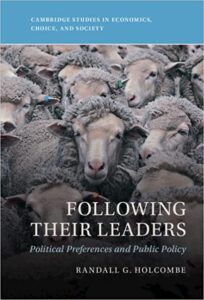Following Their Leaders: Anchor and Derivative Preferences
In my previous post in this series, I described how Randall Holcombe separates our instrumental preferences (the outcomes we prefer) from our expressive preferences (what we prefer to express). But there is another, more important preference classification he outlines. Holcombe suggests a major factor in how our preferences are formed is through the interaction of what he calls anchor preferences and derivative preferences.
What are these different kinds of preferences? Let’s start with anchor preferences:
Derivative preferences are, as the name might suggest, preferences that are derived from one’s anchor preferences. As Holcombe puts it:
Anchor preferences can be broadly defined. People might anchor on a particular issue of principle—single issue voters are a classic example of how this can work:
Having anchored onto the political party most aligned with their anchor preference, people will tend to adopt the rest of the platform of that party as derivative preferences:
However, people may not anchor on particular issues, but might anchor onto their political identity as a member of a party. They think of themselves as being Republicans, or Democrats, and anchor to those parties, deriving their political preferences from those anchors:
When people anchor to a political party, one consequence is that the official party platform can reverse its position on what was supposed to be an issue of major importance, and citizens who anchor on their party identity will simply alter their derivative preferences to follow along with the party:
These are voters whose beliefs about free trade were simply a derivative preference, derived from their anchor preference of identification with the Republican party. When the Republican party advocated free trade, so did they. And when the Republican party turned away from free trade, so did they. In the same way, after Trump’s rise to prominence in the Republican party, support for free trade among Democrats shot up dramatically, to significantly higher levels than Republican support for free trade during the presidency of George W. Bush.
Putting it mildly, it is highly unlikely that this rapid rise in support for free trade among Democrats was caused by millions of members of the party suddenly reading a basic economics textbook and simultaneously realizing the case for free trade is very strong, nor can the sudden loss of support for free trade among Republicans be realistically explained by the reverse process. The far more likely explanation is that voters, by the tens of millions, will simply alter their positions on issues to fit whatever the partisan politics of the moment dictates. This is just one of many examples where major political parties in the United States can alter their positions on issues of great importance, even swapping positions with the opposing party, yet the people supporting or opposing those parties remain largely unchanged.

Holcombe reviews a wide range of literature that helps explain why most policy preferences are derivative for most people. Among the relevant factors is the endowment effect—people value their political identities simply by having them and will be reluctant to change them. There is also the bandwagon effect—when it seems like most members of your identity group, peer group, or social circle are going in a particular direction, most people go along, particularly when there is nothing instrumental to gain by dissenting.
The desire to reduce cognitive dissonance is also at play. Holcombe uses the metaphor of grocery shopping to outline some of the differences between market preferences and political preferences:
However, the contents of a political shopping cart are formed in a very different way:
If shopping were done this way, it’s all but certain that everyone’s cart will lack many desired items and contain other items they’d never buy if it were up to them. But since the contents of the cart isn’t up to them, voters simply go along with whatever the bundle contains:
So far, I’ve focused on Holcombe’s analysis of how preferences are influenced and formed among voters. But a key component in Holcombe’s book is how policy preferences are formed by the elite. In what way do the preferences of the elite differ from voters, and more importantly, what are the differences in the incentive structures faced in preference formation between elites and voters? That will be the subject of the next post.
(0 COMMENTS)